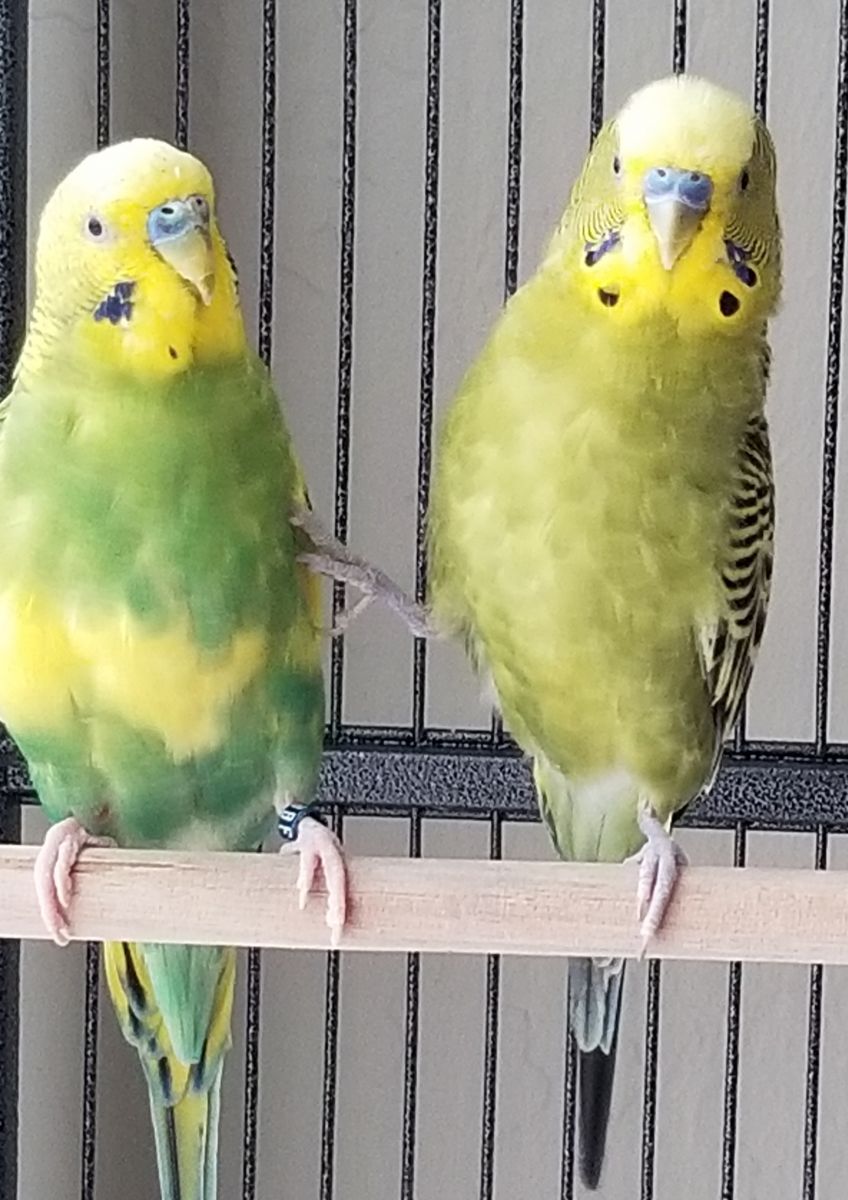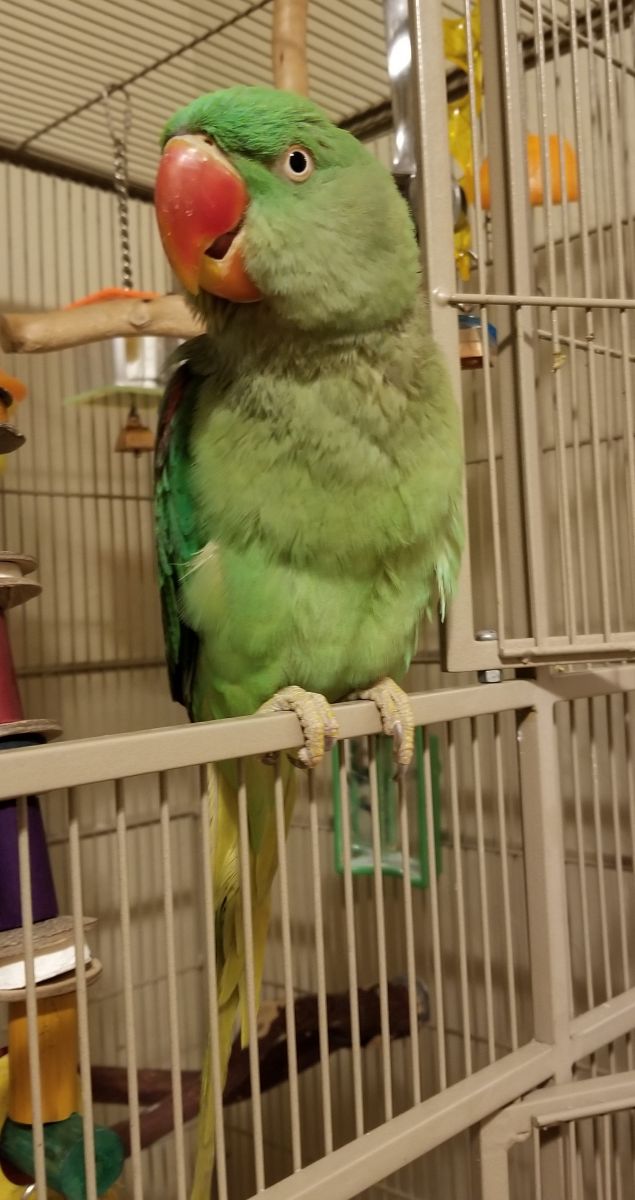Featured Volunteer: Amy Randall Yee
Article from “The Mickaboo Bird Rescue Companion”
Published October, 2020
By The Editor
Amy Randall Yee is one of our newer volunteers, and she's already experienced many roles: budgie specialist, foster parent, virtual adoption fair presenter, and more. It is Mickaboo's honor to recognize her many achievements by naming her this quarter's Featured Volunteer. Let's make her acquaintenance.
How did you find out about Mickaboo?
 One October day two years ago, while riding my bike from my home in San Jose to the Campbell Farmer’s Market, I saw a bird sitting on a low fence very close to the road. On second glance, I saw it was a budgie. I stopped my bike and went over to talk to him, and he let me pick him up.
One October day two years ago, while riding my bike from my home in San Jose to the Campbell Farmer’s Market, I saw a bird sitting on a low fence very close to the road. On second glance, I saw it was a budgie. I stopped my bike and went over to talk to him, and he let me pick him up.
I posted his picture on neighborhood eLists and on Paw Boost, but no one ever claimed him. I bought him a large cage and named him Quechee, after a charming little town in Vermont where we had lived a few years before.
Not long after that, I realized Quechee needed a companion. Too much time in front of the mirror is not good for a guy! I found Mickaboo online, went through the approval process, and adopted Coco. Coco and Quechee have become best buddies. They play, chirp, squabble and make up, and groom each other all day. It is so much fun having them in the house.
What do you do for Mickaboo, and what do you enjoy about it?
I am the Budgie Intake Coordinator, which means I am the air traffic control person for incoming budgies. Sometimes it feels like I have budgies flying in from all directions, looking for a safe place to land. It is my job to find them that safe place. I enjoy feeling that I am helping small birds who might otherwise meet a sad fate.
I have also fostered a number of birds, and I’ve really enjoyed working with different species coordinators and getting acquainted with various species of birds. At the moment my fosters are an Indian Ringneck and a Canary Winged Parakeet. I am also helping with the online holiday party and the virtual adoption fairs.
What is the most memorable experience you've had with Mickaboo?
 My very first foster bird was an Alexandrine (quite a large parrot, about 20” long) named Mila. Mila had hormone issues, which I didn’t even know was a thing at that time, and had been at For the Birds being treated for a mouth infection. When I picked her up, Dr. Van Sant brought her out to the waiting room, set her cage down, and exclaimed “She’s a pistol!” I asked if she was socialized and would step up. Dr. Van Sant smiled and shrugged her shoulders as if to say “It’s never been tried!”
My very first foster bird was an Alexandrine (quite a large parrot, about 20” long) named Mila. Mila had hormone issues, which I didn’t even know was a thing at that time, and had been at For the Birds being treated for a mouth infection. When I picked her up, Dr. Van Sant brought her out to the waiting room, set her cage down, and exclaimed “She’s a pistol!” I asked if she was socialized and would step up. Dr. Van Sant smiled and shrugged her shoulders as if to say “It’s never been tried!”
The morning after I got Mila, I went into the extra bedroom where she was quarantined to find her cage doors were closed and latched, as I had left them the night before, but the cage was empty. Apparently, I was fostering Houdini. After I stopped staring at the cage in disbelief, I looked around the room and there she was, sitting calmly on a dresser like that was just where she belonged. Mila had apparently figured out how to unscrew the screw-latch with which I had secured one of the upper doors to her cage, and pushed the door open. Needless to say, after that incident, all her cage doors were double-latched with two different kinds of latches. Like many companion birds, Mila was very smart.
When I first got Mila, she’d fly screaming to the other side of the cage when I approached her. I worked with her daily and four months later, although she wouldn’t step up on my hand, she would calmly step up onto a perch, come out of her cage, eat treats from my hand, fly around, and find her way back into her cage when she was ready. It was a satisfying feeling to know I had helped socialize her so she was more readily adoptable - and indeed she was adopted by a nice family.
What would you say to others who are considering volunteering with Mickaboo?
I would say that you will meet a lot of wonderful people and amazing birds. That you will learn a lot about companion birds, and that some of what you see will be heartbreaking, but much will be rewarding. In an ideal world, Mickaboo’s birds would be living in the wild in their native countries and there would be no need for a Mickaboo. But we don’t have an ideal world, so the least we can do for these birds is try our best to provide them safe and comfortable accommodations, stimulating environments, proper diets, and good medical care when needed. Helping to accomplish this for these amazing creatures is very gratifying.
Back to newsletter's front page.
Copyright © 2020 Mickaboo Companion Bird Rescue
All Rights Reserved
